Workshops
Our Workshop Methodology
One of the research methods we apply in our lab is to test our technologies through workshops. This serves multiple purpose:
- We prepare our tools for real-world usage, debug, write tutorials and example code.
- We share our instruments with performers who become ‘ambassadors’ of our systems.
- We gain feedback on the projects as we are developing them and a reality check.
- We explore the perception of AI and analyse the language and discourse that emerges
If you like what you see here below, you might suggest a workshop at your institution or get in touch for a collaborative workshop.
:::::::: Past Workshops ::::::::
Hauntography, a Hauntology-Inspired Framework to Create and Think Through Spectrality
7 January 2026, with students from the London Architectural Association, at Intelligent Instruments Lab, University of Iceland.
Nicola Privato introduces and discusses the framework to analyse and create with spectral phenomena that he developed during his PhD research on music AI. Thomas Pausz discusses his artistic practice focused on hauntology theory and reflect on it through this lens. The students are then invited to apply the framework to reflect on their own work.
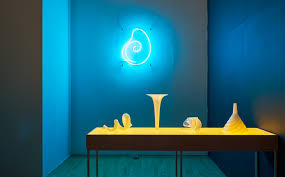
Thomas Pausz Exhibition Haunted Ecologies.
Voice AI and Creative Misuse with Tungnaa Demonstration
27 May 2025, Goethe Institut Portugal (Online)
Jonathan Reus and Victor Shepardson give a talk on creative misuse and the future of voice, and a demo of the newly open-sourced Tungnaa instrument.
Archived as part of the Goethe Institut Art Meets Tech series.
OFUR-ORGEL / HYPER-ORGAN, Fríkirkjan í Reykajvík, April 2025.
Áki Ásgeirsson and Victor Shepardson lead a workshop and concert using the MIDI controlled organ in Fríkirkjan. With Alexandros Drymonitis, Tómas Manoury, gamut inc, Einar Torfi Einarsson and Julie Zhu.
[info]
Tölvera Tutorial at NordCHI 2024, Uppsala, Sweden
Jack Armitage will be giving a half-day tutorial on Tölvera titled “Tölvera: Interactive Self-Organising Systems for HCI Research & Artistic Practice” at NordiCHI 2024, on Monday 14th October, in Uppsala, Sweden.
For sign-up and more, visit the tutorial page.
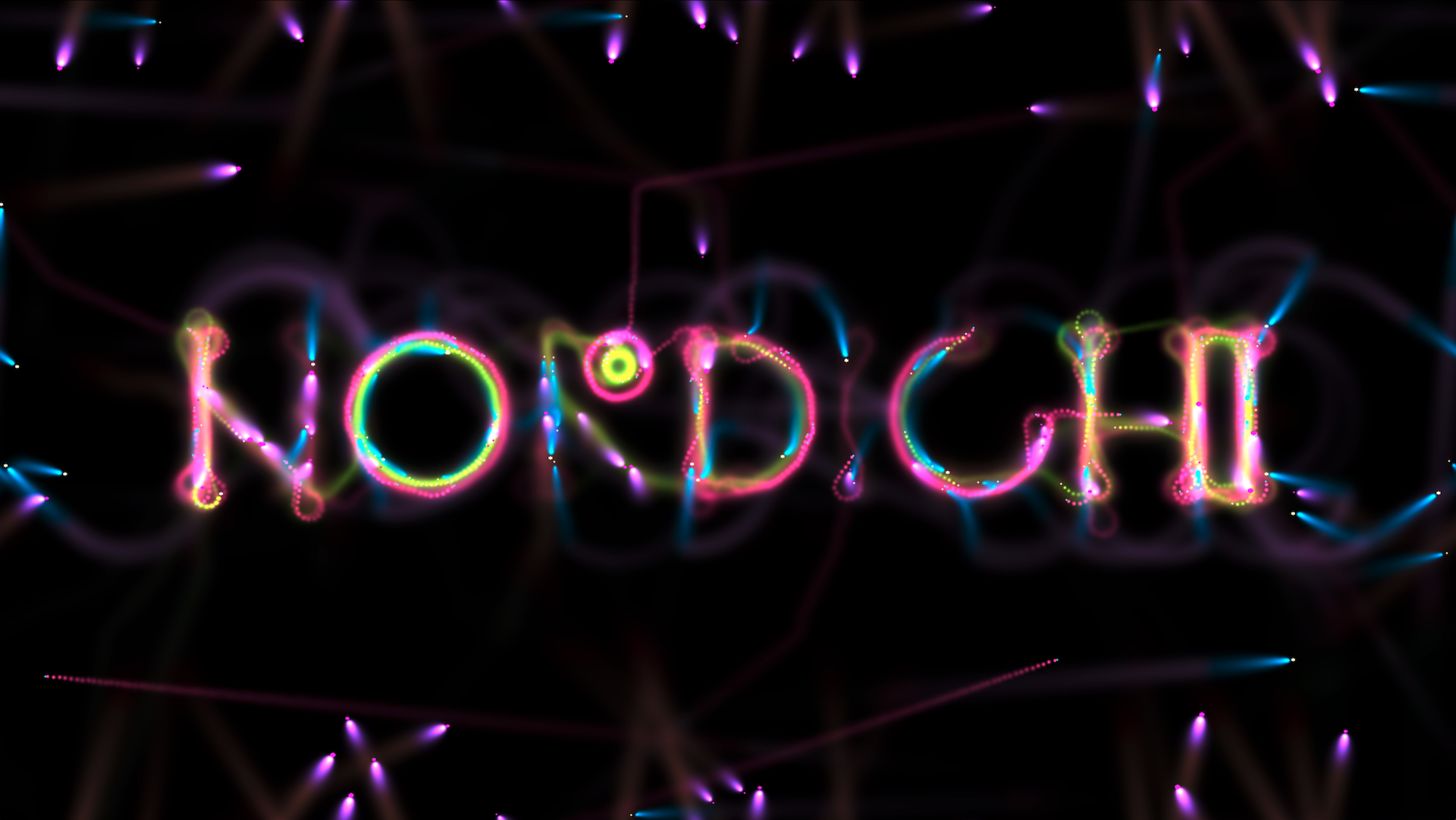
NordiCHI logo recreated with physarum slime in Tölvera.
In artificial intelligence-based human-computer interaction research, self-organising systems and artificial life offer unique opportunities for creative coding and interaction design that remain underexplored compared to the dominant paradigm of machine learning. These approaches can yield emergent, dynamic, and open-ended interactions that are difficult to achieve with traditional ML techniques, and at a fraction of the computational cost.
Tölvera, a Python-based medium for creative exploration of self-organising systems, was created to address this gap in the field of music interaction and to support artistic research. This tutorial offers an introduction to Tölvera and its myriad features for interaction across sonic, visual and other modalities.
ii lab workshop at The Basque Centre in Djúpavík
Djúpavík, Strandir, June 6th, 2024.
We ran an open workshop on making musical instruments from trash in Djúpavík. The goal was to promote sustainability and reuse while connecting with Basque cultural heritage. Seafood is also a part of the project. The Intelligent Instruments Lab at the Iceland University of the Arts and the Icelandic Basque Association organize the studio in collaboration with the Factory art exhibition in Djúpavík.
Thor Magnusson also gave a talk about the history and development of musical instruments.
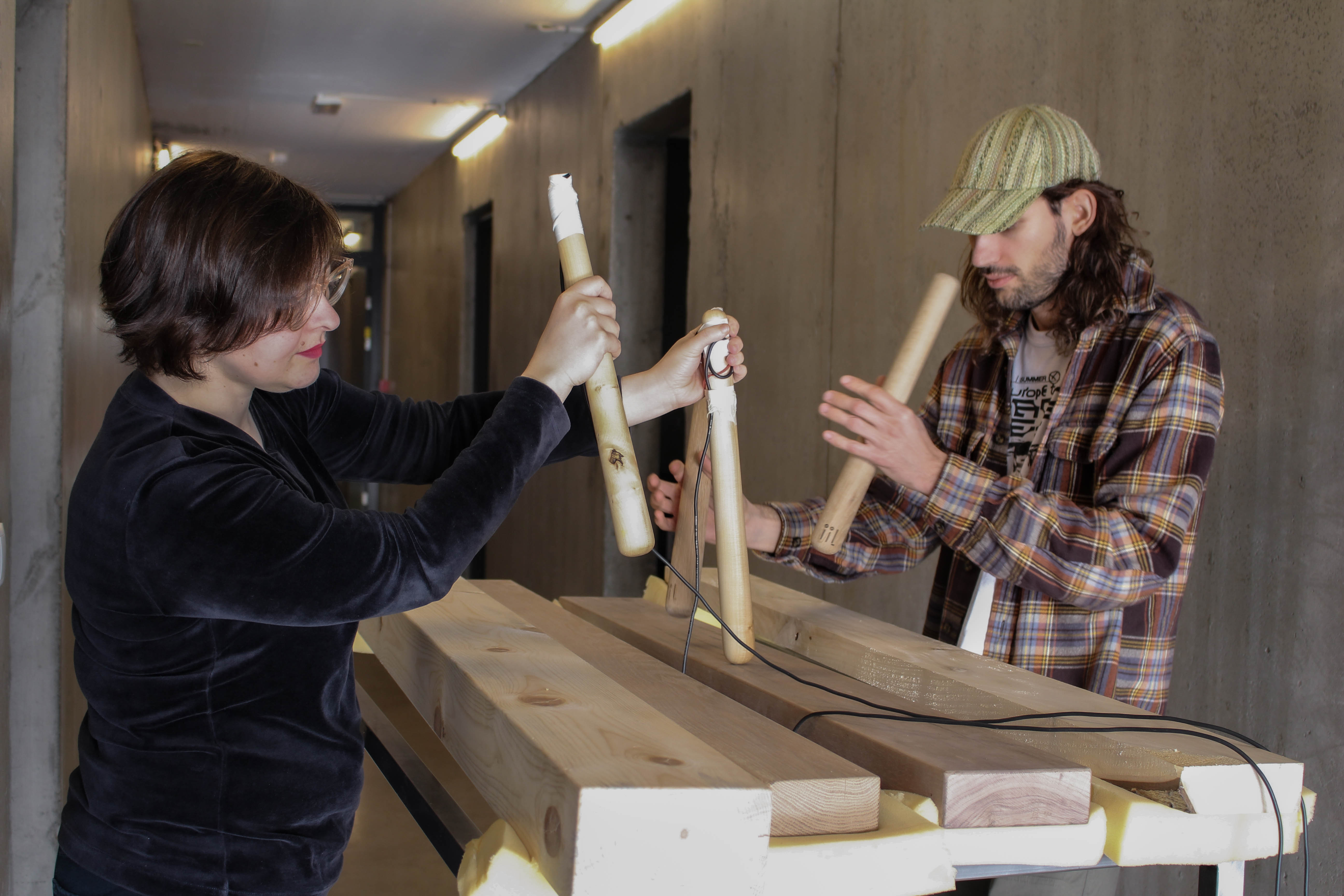
The Basque txalaparta instrument
Workshop: Exploring AI Musicianship with Dadabots
As part of our ICLC 2024 Satellite Event, we were pleased to welcome our AIMC 2023 keynote speakers Dadabots to the lab to give a workshop on their groundbreaking tools and practices for AI musicianship.
In the workshop we explored how different flavors of neural network architectures (from LSTM to Transformer to Diffusion) make different music. We explored how it extends musicianship beyond just making songs into making 24/7 livestreams. In the workshop participants learned how to train or finetune their own custom models & run them. Dadabots also presented what it’s like collaborating with artists & getting into (and out of) copyright trouble. They also hinted at what capabilities are on the horizon.
This workshop was suitable for a general audience interested in music, possibly even making music for the first time. But also for the deeply curious we’ll dip into the science & tech & are happy to answer more advanced questions.
Finally the workshop introduced “prompt jockeying”. It’s DJing but harder. If a DJ must be fluent in their rekordbox collection, a PJ must be fluent in their pytorch model. Prompts can be created live together with the audience — fake artists, genre fusions, rap features & producer collabs that never happened.
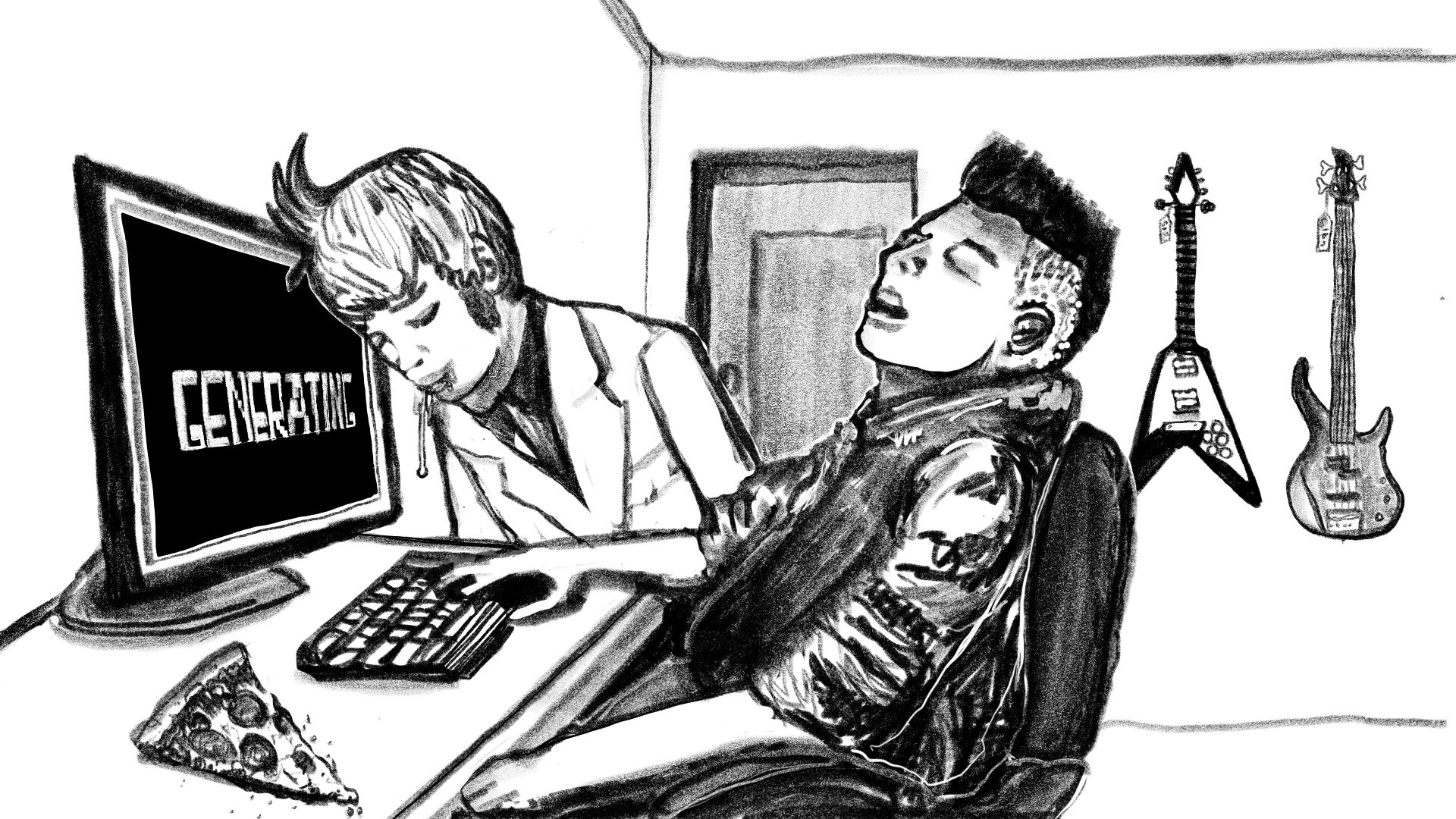
Dadabots, illustrated edition.
Composing and Performing with AI
SaMPL Lab, Padova, Italy, and Conservatory of Padova. 20 and 27 May, 6 June 2024.
In this workshop, Nicola Privato introduced practical tools and methodologies for performing and composing with AI, including mapping and feature extraction tools, generative symbolic models and neural audio synthesis. The workshop began with a broad presentation of these systems, of their historical evolution, and in the description of a series of application scenarios, and continue by introducing a selection of systems developed at the Intelligent Instruments Lab and IRCAM. The participants explored the algorithms and the compositional strategies they define, providing the participants with the necessary technical skills to autonomously apply them. The workshop included presentation of the participants’ project proposals and the identification of effective strategies for the design and training of the proposed systems.
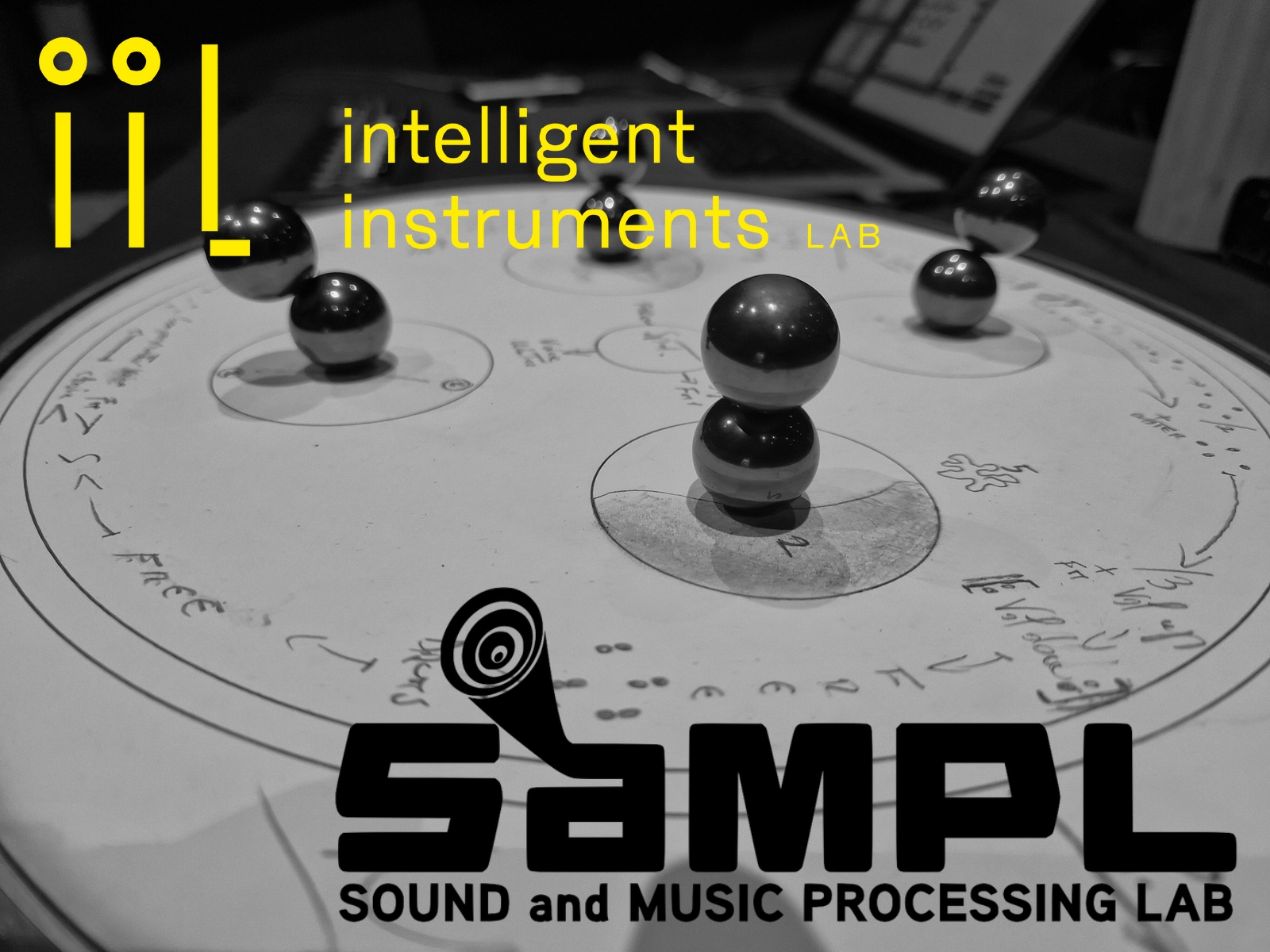
Composing and Performing with AI
Overtone Flute Workshop
Intelligent Instruments Lab, Reykjavik, May 6th, 2024.
The oldest musical instruments we know of are bone flutes from ca 40.000 years ago. The flute is an instrument that exists in most cultures and we find them in mythology and fine art in all periods. It is an instrument of the human breath, of the psyche, highly expressive and personal. But how are flutes made? How do they work?
People were invited to take part in a workshop that demonstrated a simple process of making an overtone flute. These flutes are played in many parts of the world, from Scandinavia to East Africa, as are useful for understanding the overtone series. The making process is simple and takes under an hour. We made two instruments each one for experimentation in the workshop and one for a collective performance.
In this workshop we sought a diverse group of people from a broad background. Composers, performers, amateurs, designers, enthusiasts and people interested in acoustics and the physics of instruments joined the workshop. We explored the potential of collective music making with these instruments.
The workshop was in two parts: acoustic flutes and intelligent flutes. The first part of the workshop involved people making their own flute and learn to play it. After lunch was an exploration of how to add electronics and do further experimentation with the flute. The workshop was followed by a concert in Mengi.
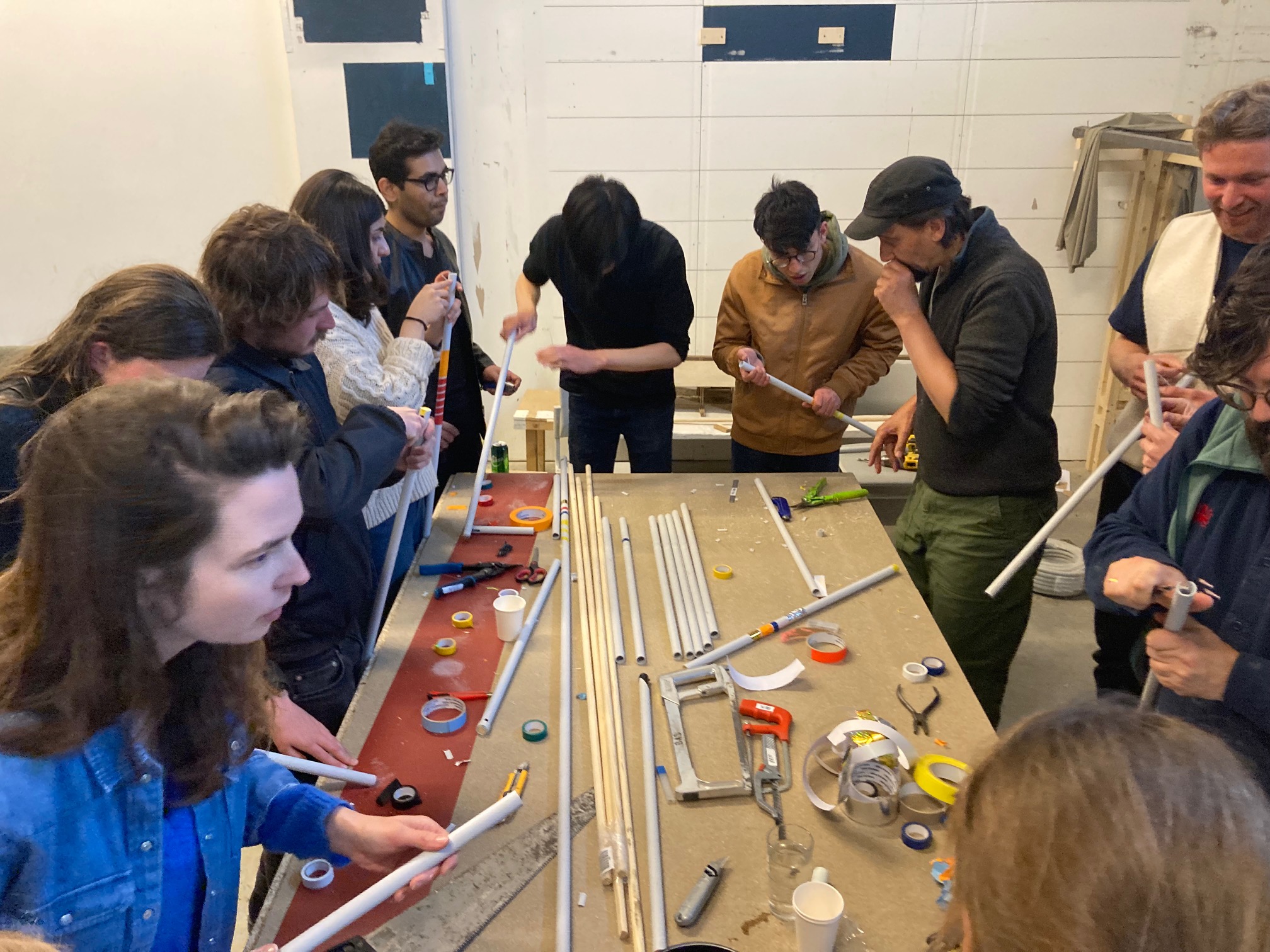
From an earlier Overtone Flute workshop
Artificial Life & Self-Organising Systems for Creativity with Tölvera
MUSAiC Lab, KTH, Stockholm, Sweden, & Tangible Music Lab (TamLab), Linz, Austria, April 2024.
Tölvera is a new Python-based tool for real-time interactive and creative computing with artificial life and self-organising systems. In this workshop targeted at those with some creative coding and some Python experience, led by Tölvera creator Dr. Jack Armitage from the Intelligent Instruments Lab in Reykjavík, you will learn how to create a wide variety of systems with interesting emergent behaviours, and interface with them using Open Sound Control, Interactive Machine Learning, Computer Vision, Sonification, Neural Audio Synthesis, and Live Coding.
YouTube Playlist for Tölvera
E-Textile No-Input Mixer workshop
BGSU, Bowling Green, Ohio, 11 April 2024.
E-textiles are woven, knitted, or otherwise fabric structures which also function as electrical components. In the no-input e-textiles project, we put conductive knitted and woven pieces into a feedback audio circuit, as part of a no-input mixing board setup.
In this workshop, Victor Shepardson gave a talk on IIL and the project to MA composition students at Bowling Green State University, and participants were invited to try the no-input mixing board and knitted e-textile mat for themselves.
Embedded Sketching for Neural Audio Synthesis
TENOR Conference, Zurich, Switzerland, 4 April, 2024.
Stacco is an instrument-score with embedded permanent magnets. It attracts and repels magnetic spheres and detects the changes in its magnetic fields upon interaction. It is designed to perform with neural audio synthesis models, in which sound features are represented and distributed within entangled multidimensional sonic spaces. Stacco allows drawing and embedding scores into the interface itself, and by bridging gesture and notation it overcomes some of the inherent limitations of traditional notational methods as applied to this novel technology.
In this workshop led by Nicola Privato and Giacomo Lepri, participants were invited to compose and perform sketches for neural synthesis models, by drawing, embedding and layering tracing paper sheets on top of Stacco’s surface. The workshop was followed by a discussion on the scores created by the participants and on the affordances of this compositional strategy as applied to neural adusio synthesis.
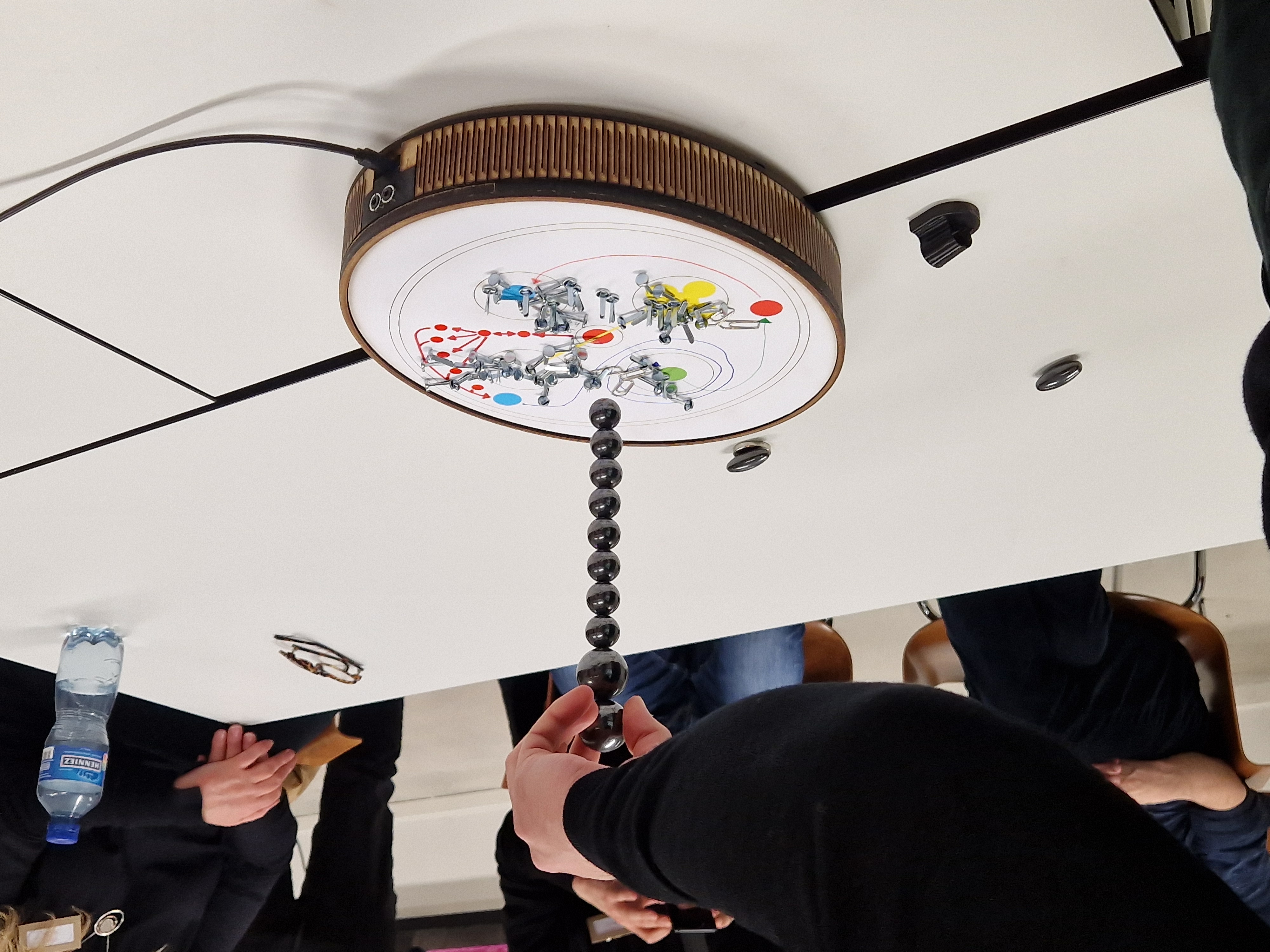
From Embedded Sketching for Neural Audio Synthesis
Sketching Magnetic Interactions for Neural Synthesis
Łódź, Poland, 22 October, 2023.
This workshop focused on Stacco, one of the magnetic instruments developed at IIL and specifically designed to perform and compose with Neural Audio Synthesis. The Participants playfully explored neural synthesis models by displacing magnetic spheres on a board with four attractors, using carboard sheets that could be placed on top of the instrument to notate their compositional ideas.
They sought to answer the question: What gestures, interactions and musical ideas emerge from this intuitive and fun way of composing with Neural Audio Synthesis?
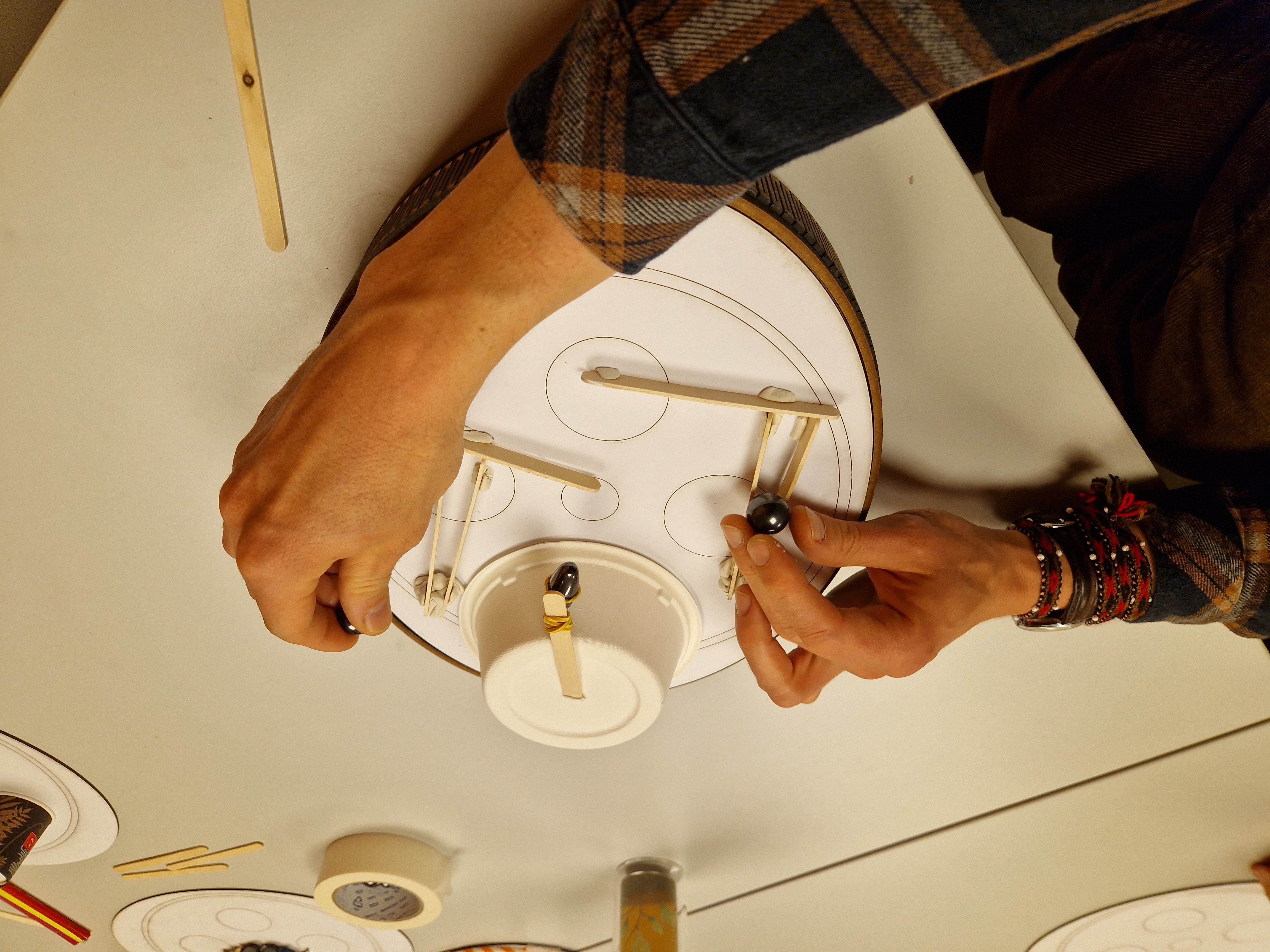
From Sketching Magnetic Interactions for Neural Synthesis Workshop
Live Coding Self-Organising Systems
CuteLab.NYC, New York, USA, September 2023
“Before the Underbelly show tomorrow, come check out a Tölvera live coding workshop with Lil Data ! Totally free and guaranteed to be super interesting.”
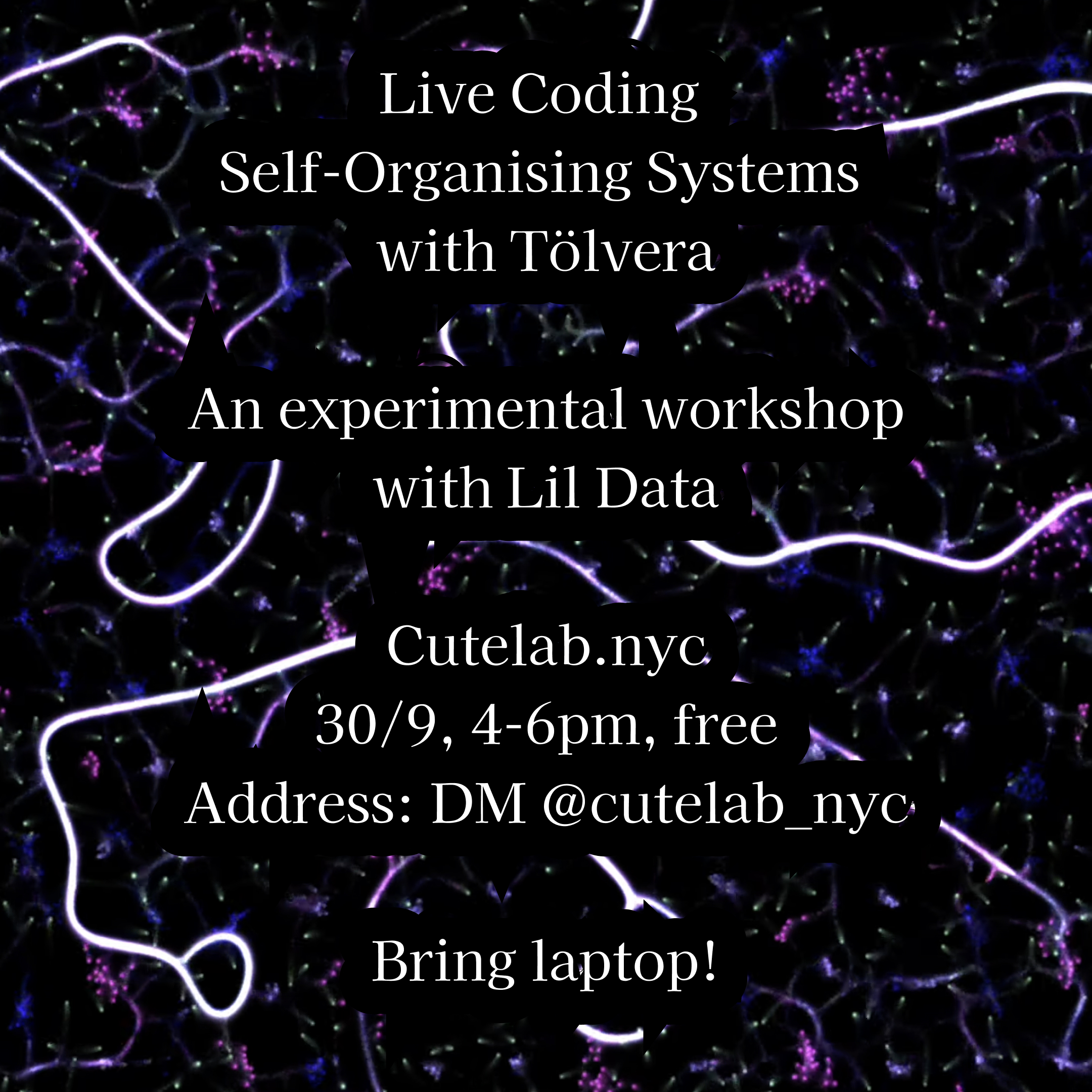
Workshop Promotional Image
AI Music Creativity (AIMC) Conference
Brighton, UK, 29 August, 2023
We ran the International Conference for AI Music Creativity (AIMC) in August 2023.
The theme of AIMC 2023 was Intelligent Performance Systems, where we were interested in how AI was applied in real-time artistic performance. This included software, physical musical instruments as well as interactive installations. Our focus was on how artists engaged creatively with intelligent objects that contributed to the way we performed and thought music. With this theme we sought artistic and scientific contributions on the topics of creativity, autonomy, authenticity, agency, epistemic tools and human-machine co-creativity.
How do intelligent tools change the way we think and perform our music? What is the role of intelligent instruments in performance?
YouTube Playlist for AIMC 2023
Agential Instruments Design Workshop
Brighton, UK, 29 August, 2023
Physical and gestural musical instruments that took advantage of artificial intelligence and machine learning to explore instrumental agency became more accessible due to the development of new tools and workflows specialized for mobility, portability, efficiency and low latency. This full-day, hands-on workshop provided all of these tools to participants along with support from their creators, enabling rapid creative exploration of their applications as musical instrument designs.
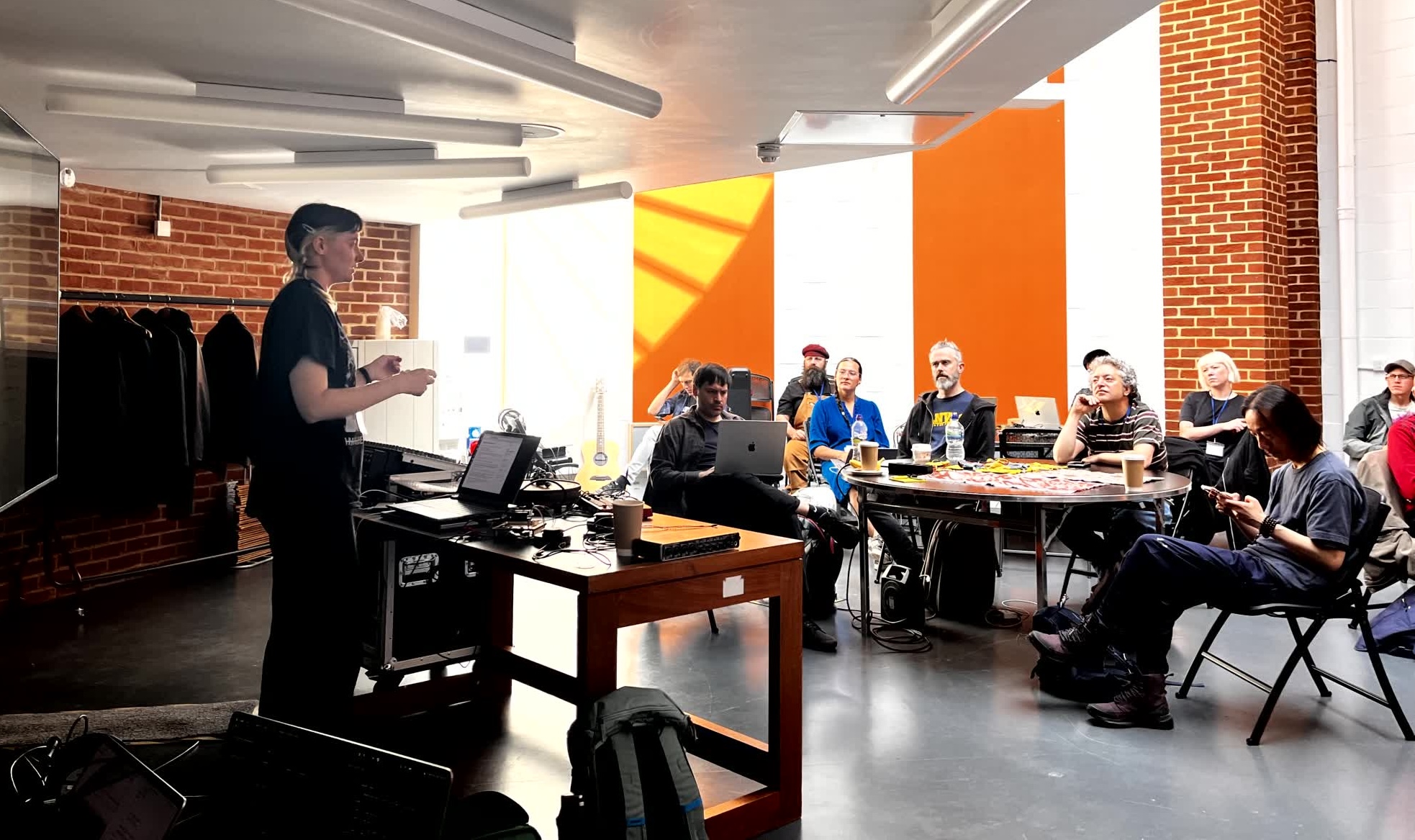
Teresa Pelinski, PhD Candidate, presenting at the Agential Instruments Design Workshop
Txalaparta and AI
The txalaparta is a traditional Basque percussion instrument for two performers. It has a unique performance method as it needs two performers to play - its performance is about the commuication between the two players. The instrument is played by hitting wooden batons straight down onto wooden planks (not tuned in any notes) and controlling weight, force and velocity. It is a play between physics and control.
The workshop introduced the percussive techniques used to play the instrument and the possibilities of introducing creative AI technologies developed at the lab. We had been exploring how machine learning models could perform with a human player. The workshop therefore taught the technique and also gave workshop participants the opportunity to play against an AI system (name of your own choosing).
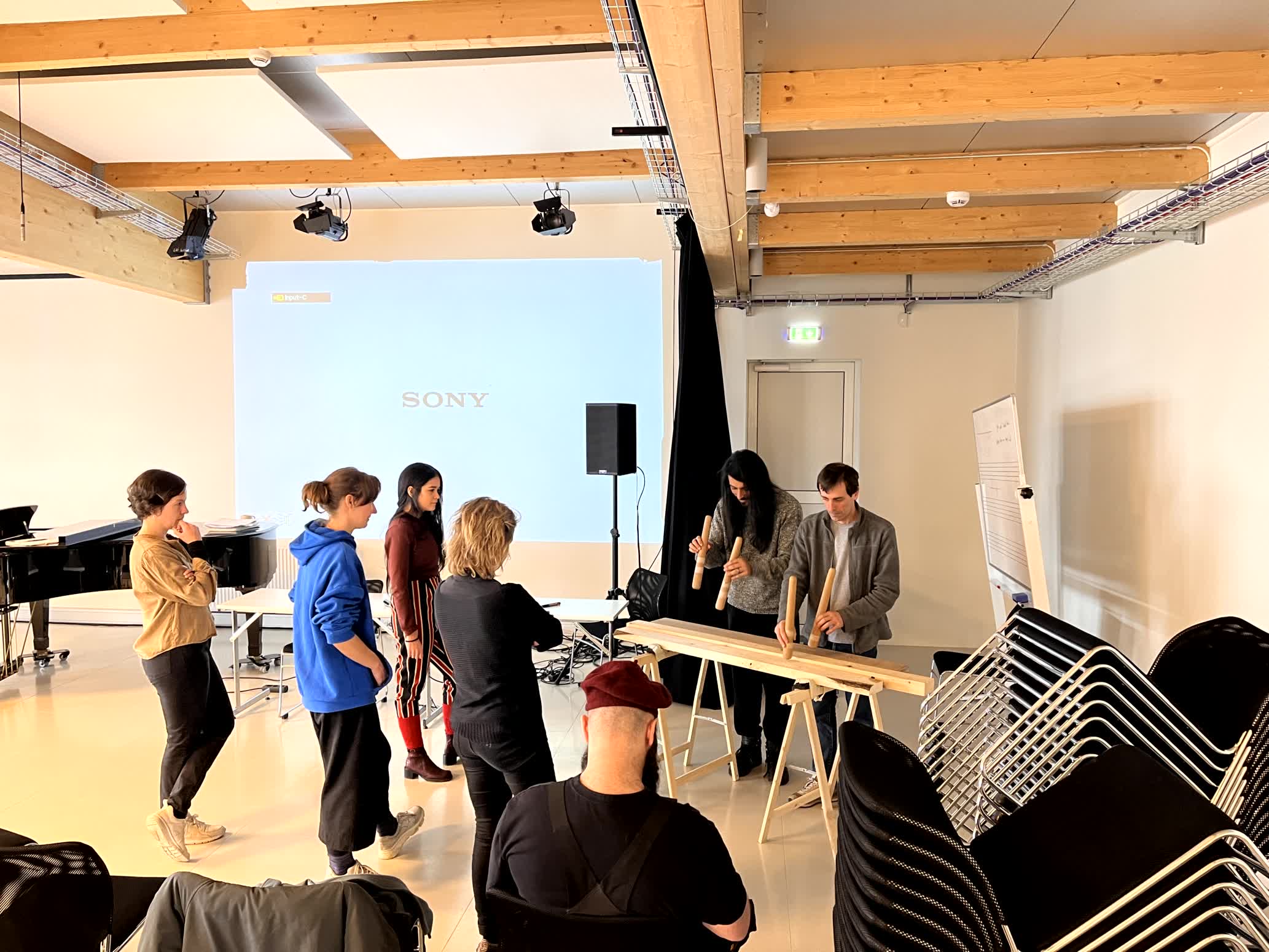
The black logo with logomark and wordmark
Txalaparta at Strandir
The txalaparta is a traditional Basque percussion instrument for two performers. It has a unique performance method as it needs two performers to play - its performance is about the commuication between the two players. The instrument is played by hitting wooden batons straight down onto wooden planks (not tuned in any notes) and controlling weight, force and velocity. It is a play between physics and control.
The workshop introduced the percussive techniques used to play the instrument and the possibilities of introducing creative AI technologies developed at the lab. We had been exploring how machine learning models could perform with a human player. The workshop therefore taught the technique and also gave workshop participants the opportunity to play against an AI system (name of your own choosing).
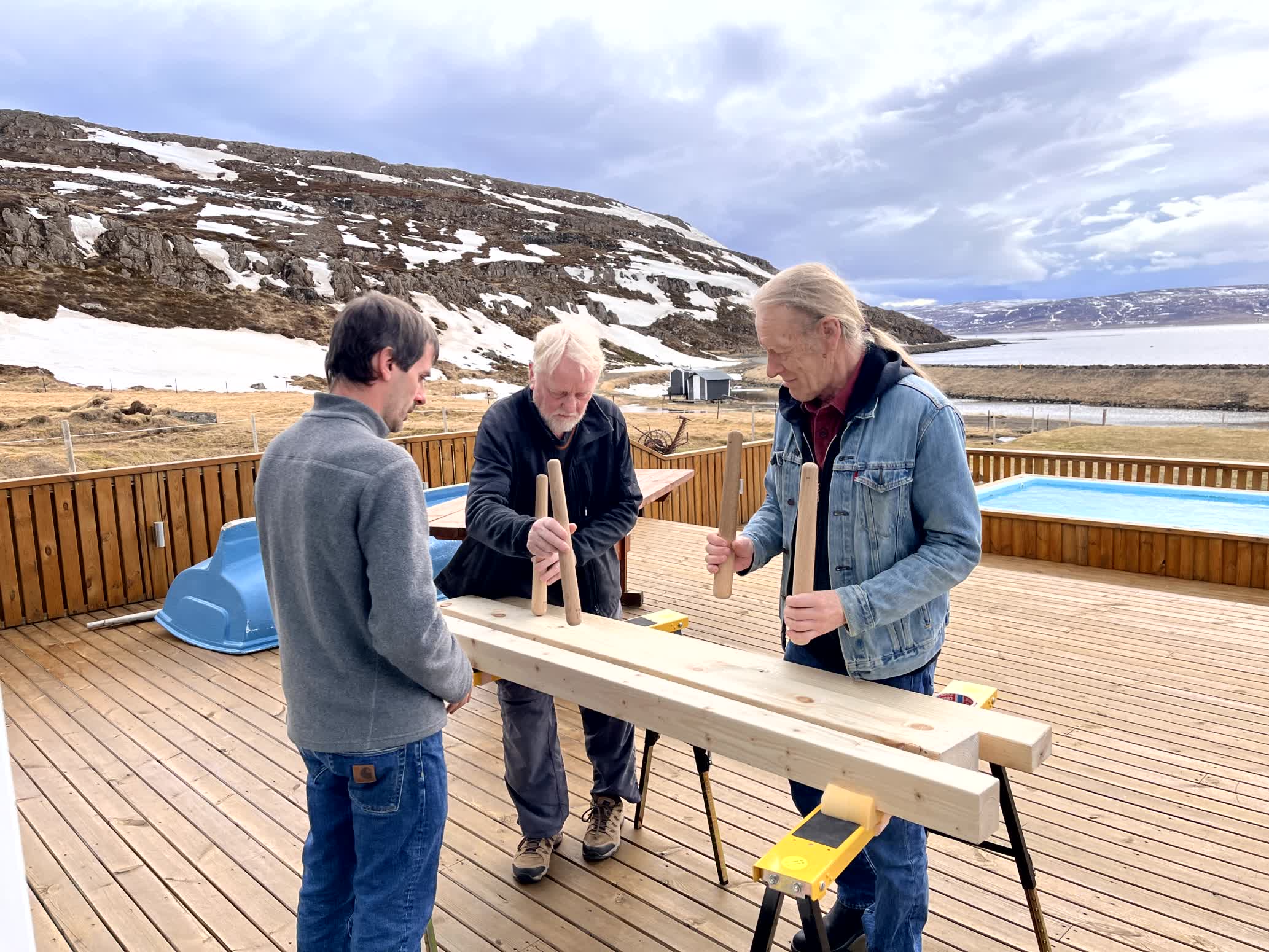
The black logo with logomark and wordmark
Organic Intelligence
Intelligent Instruments Lab & Hallgrímskirkja, January 2023
A workshop on the AI control of Hallgrímskirkja’s Klais organ. The workshop introduced creative AI technologies developed at the lab and people could use our systems such as the Notochord, Agential Scores, Scramble and more to control the organ. These involved AI and ALife, but participants could come up with their own systems too. We also introduced our Organolib (technical library of sensors and actuators) which could be used to create novel interfaces. No technical skills were required for this workshop. We were hoping for a diverse group of people from all walks of music!
In the workshop we learned about how the organ worked, both for human players and how the organ’s MIDI connection could extend human capabilities, both in terms of performance and composition by using alternative intelligence.
Organic Intelligence Workshop
Living Looper Workshop
Intelligent Instruments Lab & Mengi, November 2022
We hosted a Living Looper Workshop for electric guitarists. The Living Looper substitutes gesture for memory: an assemblage of machine listening and neural synthesis algorithms mutate and refract the sound of the electric guitar. It weaves steel guitar strings into a squelching, growling fabric; we will each tug on a thread and see what happens. The workshop ended with a concert in Mengi on Saturday night, where we showcased the results of the workshop.
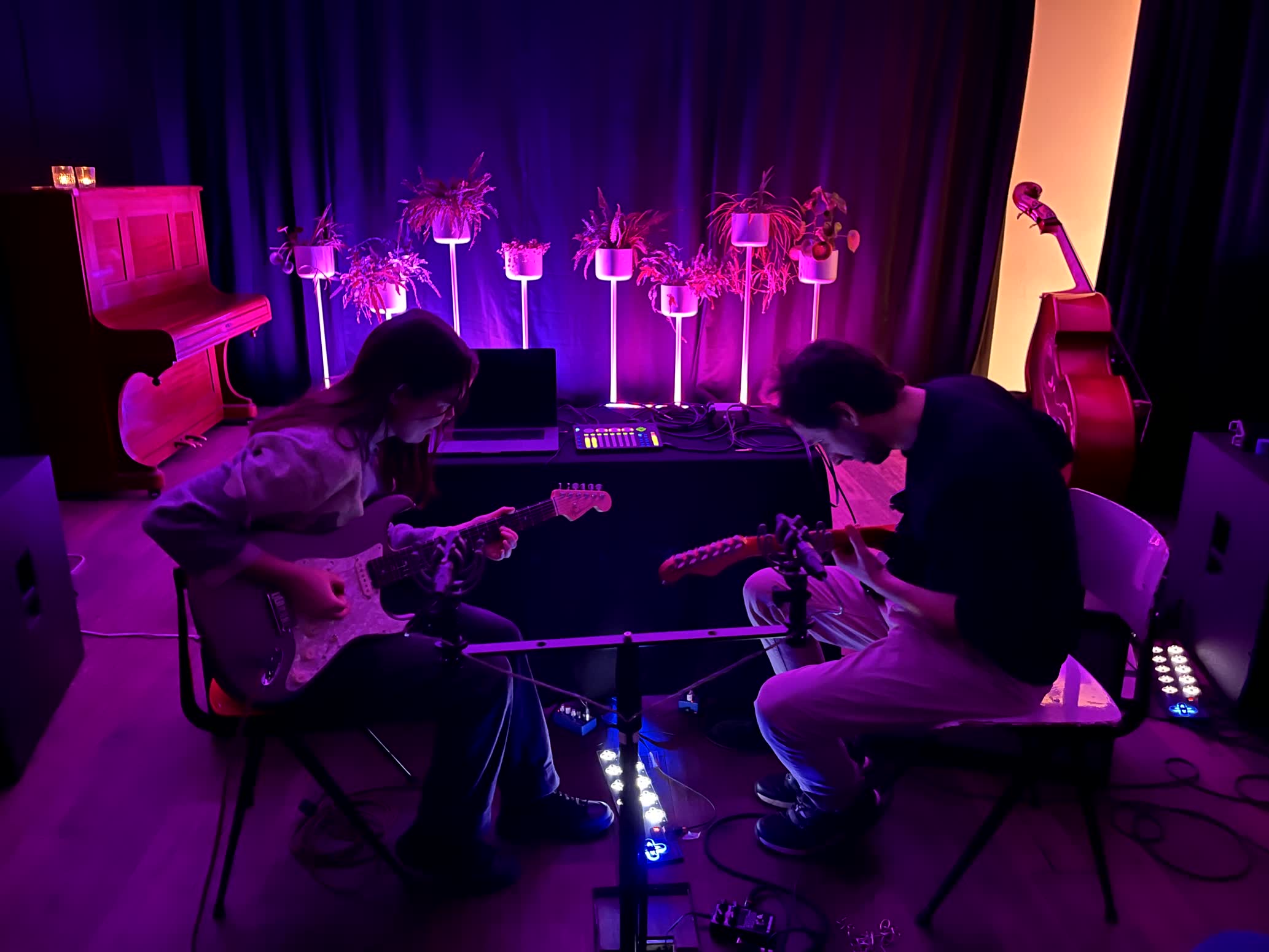
Living Looper Workshop
Embedded AI for NIME: Challenges and Opportunities
New Interfaces for Musical Expression (NIME), Online, June 2022
In collaboration with Augmented Instruments Lab and Emute Lab.
With this Workshop we brought together researchers with the common interest of working with and developing embedded AI for New Interfaces for Musical Expression (NIME), and to jointly identify the challenges, trends, and technologies in use. Furthermore, we expect it to serve as the starting point for an embedded AI NIME community and as future reference to help newcomers get started with embedded AI.
Embedded AI for NIME Proceedings for Workshop Session 1
Nordic Music Days
Intelligent Instruments Lab, Reykjavík, Iceland, October 2022
In this workshop people of all skills and backgrounds could come and explore the ideas and technologies used to create intelligent musical systems. The workshop focused on music, ideas, performance, expression, and the role of technology in creative work. During these three days we looked at how new musical instruments could change the way we thought about musical practice and made music.
Through looking at new technologies, interfaces and technical elements developed in the lab, we created the conditions for workshop participants to make their own instruments, systems, or compositions. We invited everyone to join the workshop: the only thing you needed was a deep interest in music, musical instruments and how new instruments could be built with contemporary technologies.
ii lab Workshop at ÓMAR Festival
Hjalteyri, Iceland, August 2022
Experimentation in music has always been important to the development of art, media and technology. You can mention how Edison and Bell worked simultaneously on recording technology for sound and telecommunications, or how Teleharmonium was the forerunner of Spotify with streaming music. Back in the centuries, technology can be seen as a tool that changes societies and helps us connect with each other through expression. This has not changed and musicians are still developing new tools, new interfaces and artificial intelligence through new instruments.
This festival celebrated the role of music at the edge of the possible in technology and examined how disciplines such as music, engineering, psychology, computer science and media science came together to define possible futures.
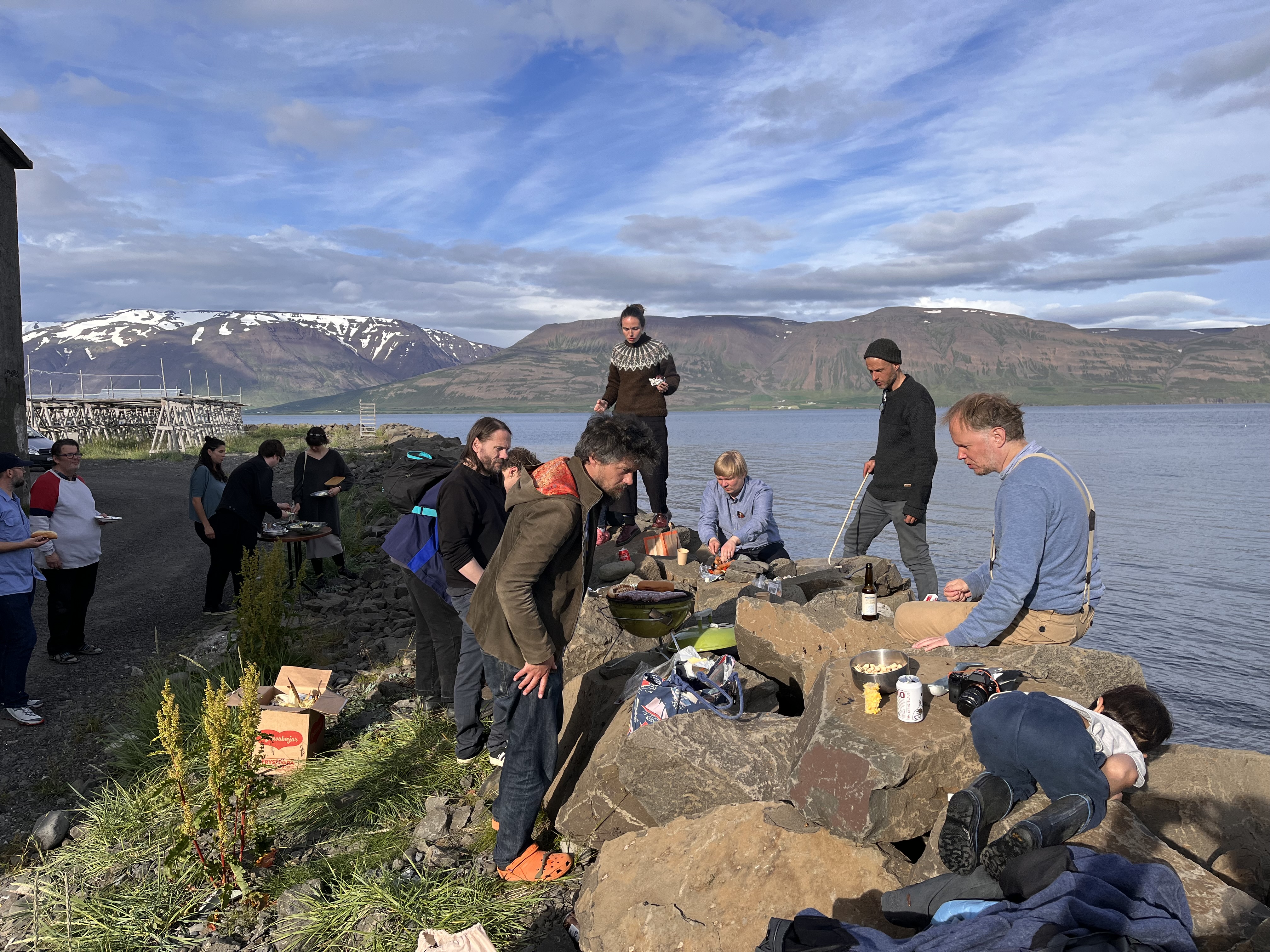
ii lab workshop at Hjalteyri
Trash Sounds Workshop
RUSL Sustainable Design Festival, Gufunes, Iceland, July 2022
We ran a workshop called Trash Sounds, a week-long intensive workshop from June 27 - July 2 on designing and performing with intelligent musical instruments made from discarded materials, as part of RUSL Festival 2022. In this workshop, participants gained hands-on experience with the cutting edge of musical instrument design, learning from scratch techniques for real-time audio programming, creative AI for gesture-sound mapping, sonic interaction design, physical instrument craft, and speculative design.
RUSL FEST - Intelligent Instruments Lab Final Concert
Living Algorithms Workshop
RAFLOST Festival, Reykjavík, Iceland, May 2022
Living Algorithms aims to celebrate and disseminate live coding - a practice involving the creation of art by writing and changing computer programs while they run. For more information about the international live coding community, see TOPLAP and Algorave.
Free live coding workshops will take place at Listaháskóli Íslands Þverholt throughout May 16-20th delivered by experts Professor Thor Magnusson (creator of the Threnoscope), Dr Jack Armitage (Lil Data) and PhD researcher Victor Shepardson. We are also pleased to invite artists Ida Schuften Juhl and Halldór Eldjárn to provide additional creative and musical inspiration and encouragement.
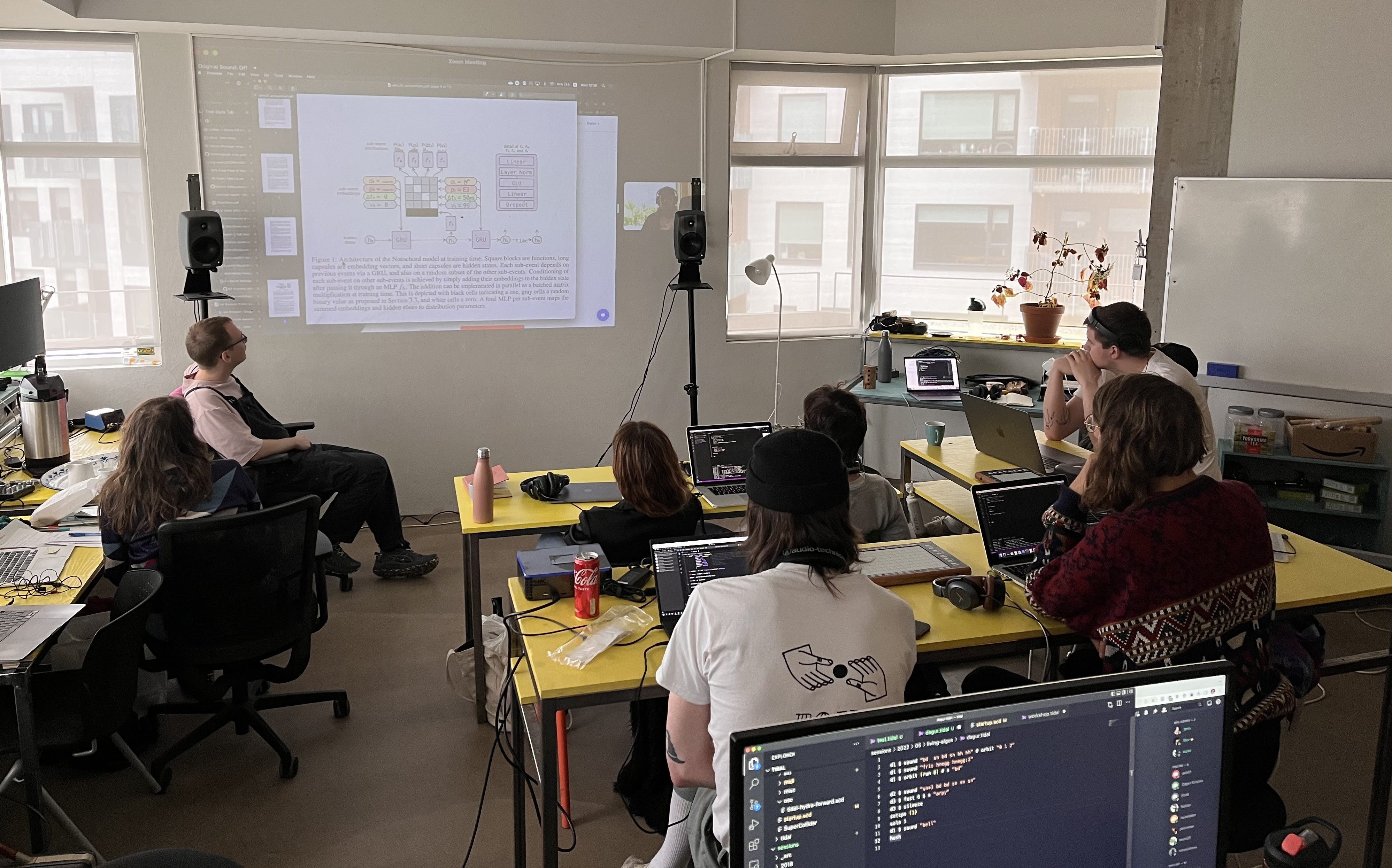
Living Algorithms Workshop
Moving Strings Symposium
Intelligent Instruments Lab, Reykjavik, Iceland, December 2021
In the first international gathering hosted by the newly formed Intelligent Instruments Lab, at the Iceland University of the Arts, we bring together musicians and instrument makers who are using contemporary technologies to rethink how we play strings.
How can digital processing, including dynamical systems and AI, augment the nature of the string, a technical element we have used in our instruments for thousands of years? How do new digital technologies change our interaction with strings and string instruments in general?
YouTube Playlist for Moving Strings
Hybrid Live Coding Interfaces (HLCI) Workshop 2021
Online, November 2021
Organised by Jack Armitage, Shelly Knotts, Alex McLean and curated by Kofi Oduro.
Curated by Montreal-based artist Kofi Oduro (illestpreacha), Hybrid Live Coding Interfaces 2021: Beyond the Screen invites practitioners of live coding and those that are adjacent to submit proposals for lightning talks, mini-performances, speculations/ponderings and/or art works.
Live coding isn’t just about what is written on the screen but also the state of mind, the expression that is being executed by the performer in relation to or in accordance with the state of the intended audience.
HLCI Workshop 2021 Session 1 Proceedings